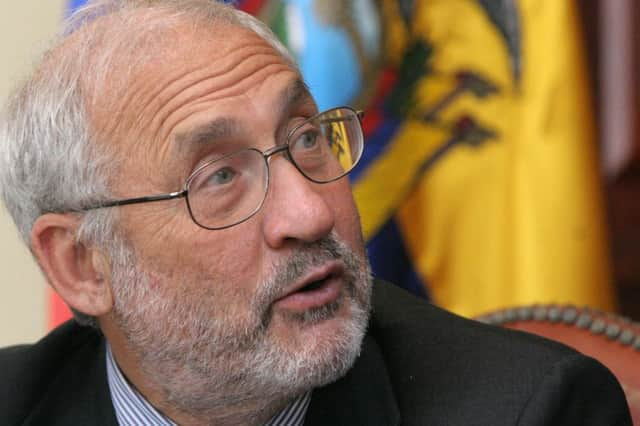Scottish independence: Stiglitz attacks No camp


The former chief economist at the World Bank launched a scathing attack on the No campaign, which he said was trying to get “anxiety levels up” and was spreading “fear” about issues such as Alex Salmond’s plan for an independent Scotland and the remainder of the UK to share the pound in a formal currency union.
Professor Stiglitz, who serves on Mr Salmond’s council of economic advisers, stated “there is a vision on the Yes side” about a fairer society on key issues such as free university education, as he gave his clearest signal yet of his sympathy for the pro-independence campaign.
Advertisement
Hide AdAdvertisement
Hide AdHe warned a No vote could lead to “more unemployment” for Scotland with the prospect of Conservative rule from Westminster and of “American-style” inequality.
And he also claimed the row over what currency an independent Scotland would use is “a lot of to do about nothing” as he dismissed the pledge from the main Unionist parties to block such a deal as “bluffs”, at the Edinburgh International Book Festival yesterday.
Prof Stiglitz said: “As an outsider, I’ve looked at the debate, particularly from the No side. I’ve been a little bit shocked how much of it is based on fear, trying to get anxiety levels up and how little of it has been based on vision.
“There is a vision on the Yes side that I see – what would an independent Scotland be like, what could it do that it can’t do now?”
Prof Stiglitz, when asked about the rejection of a currency union by the Conservatives, Labour and the Liberal Democrats, said: “For the most part, these are bluffs.”
He argued currency union could work, saying: “If you look at the statistics for the similarities of Scotland and England, they are sufficiently similar that a currency area could work, that’s what the Fiscal Commission recommended.”
Prof Stiglitz attacked what he claimed was the cuts-driven policy of Westminster governments as he called for more fiscal stimulation to boost the economy after recession.
Advertisement
Hide AdAdvertisement
Hide AdHe said: “The austerity policies in Europe and in England have been an utter disaster. There are risks always in any economic course; there are risks of doing something and risks of not doing something.
“So the risk of staying together is you could have a Conservative government that cuts back on government spending and that would force, inevitably, cutbacks here in areas of health and education.”
However, the cross-party anti-independence Better Together campaign insisted a No vote would mean a package of more devolution for Holyrood irrespective of the result of next year’s general election.
A campaign spokesman said: “We can have the best of both worlds for Scotland. That means the progress we all want for Scotland without taking on all the risks
Meanwhile, the Nobel Prize-winning economist Sir James Mirrlees has backed the Scottish Government’s threat to renege on its proportion of the UK national debt saying that “Britain inherits the debt” if it refuses a currency union.
SEE ALSO